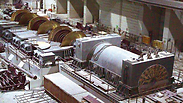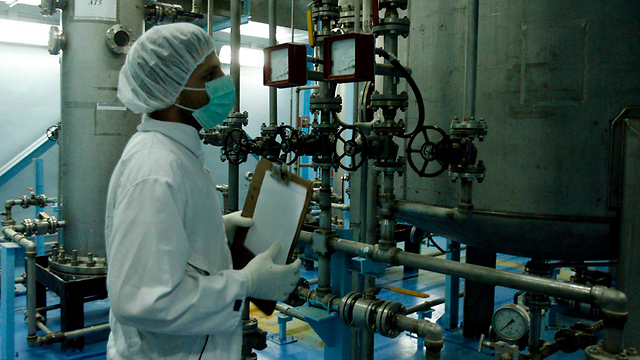
Russian teams building Iran's nuclear facility in Bushehr, 2004
Photo: EPA
Iran's "Terror King" Qassem Soleimani is among those who will enjoy sanctions relief
in the future as part of the nuclear agreement signed on Tuesday,
and now it appears another important figure on this list is the man considered to be the "father of the Iranian nuclear bomb" – Mohsen Fakhrizadeh, a senior officer in Iran's Revolutionary Guard Corps and a professor of physics.
According to the agreement, the head of the UN's International Atomic Energy Agency (IAEA), Yukiya Amano, will release a report by December 15, determining whether Iran was meeting the terms of the agreement. If world powers are satisfied that Tehran is indeed honoring the agreement, a gradual removal of international sanctions will begin, including those imposed on senior Iranians and companies.
As part of the agreement, the United States will remove 444 companies and individuals, 76 planes and 227 ships off its black list. After eight years, the embargo on the sale of missile technology to Iran will also be lifted, along with the sanctions imposed on Soleimani and Fakhrizadeh.
Fakhrizadeh is considered the driving force behind "Project 111," Iran's nuclear program, as well as behind Iran's program to develop a nuclear warhead to the many ballistic missiles the country already possesses.
The New York Times described Fakhrizadeh as the Iranian counterpart to American physicist J. Robert Oppenheimer, the father of the nuclear bomb and one of the heads of the Manhattan Project in the 1940s.
The 56-year-old scientist never participated in meetings with Western representatives during the nuclear talks. "He is fleeing would-be assassins," one of the members of the Iranian delegation explained in the past, hinting at the assassination of four scientists on Fakhrizadeh's team, which was attributed to Israel.
Iran several years ago acknowledged Fakhrizadeh's existence but said he was an army officer not involved in the nuclear program, a diplomatic source with knowledge of the matter said.
"If Iran ever chose to weaponize (enrichment), Fakhrizadeh would be known as the father of the Iranian bomb," said a Western diplomat who is critical of Iran's nuclear program but is not from any of the powers that negotiated with Tehran.
A high-ranking Iranian source, meanwhile, described Fakhrizadeh as "an asset and an expert" dedicated to Iran's technological progress and enjoying the full support of its most powerful man, clerical Supreme Leader Ayatollah Ali Khamenei.
The source added that Fakhrizadeh had three passports and traveled a lot, including in Asia, to obtain "the latest information" from abroad, but would not elaborate. Western security sources say Iran has been adept in obtaining nuclear materials and know-how from the international black market.
Fakhrizadeh's name first came up in 2007, when a UN resolution on Iran identified him as a person involved in nuclear or ballistic missile activities.
A landmark IAEA report in 2011 identified Fakhrizadeh as a central figure in suspected Iranian work to develop technology and skills needed for atomic bombs, and suggested he may still have a role in such activity.
Believed to be a senior officer in the elite Revolutionary Guards, Fakhrizadeh was the only Iranian the report identified.
"If the IAEA had a most-wanted list, Fakhrizadeh would head it," Mark Fitzpatrick, director of the non-proliferation program at the International Institute for Strategic Studies (IISS) think-tank in London, said.

















